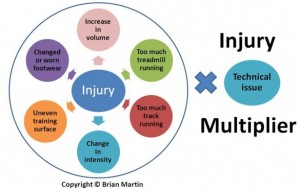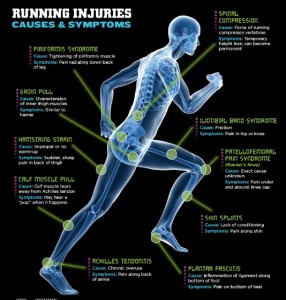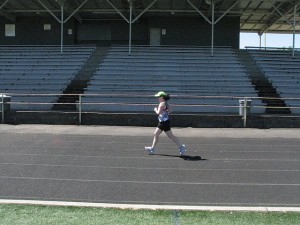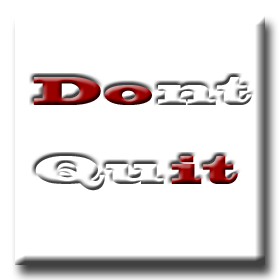It’s funny…I was going through my draft posts to see what I had (there are so many posts I’ve started and never finished!) and came across this one. I started writing it months ago…months ago when I was feeling SO GOOD about my body and the idea of injuries weren’t something I was even thinking about. I was in a good place to write the post because I wasn’t dealing with an injury, I had clarity and no emotional response to what I was writing. It’s ironic that I stumbled onto this with my current situation. I wanted to share it anyway, because I think it addresses a lot of things.
Injuries are a part of life and they really suck when you’re an athlete. As athletes we put more pressure on ourselves and are less inclined to give our bodies a chance to rest when we hurt. We’re stubborn creatures and we’re positive that we can “work through it.” Unfortunately, that’s not always the case.
This post is about how to cope with injuries that set us back. Any injury can set you back but for this post I’ll be specifically referring to the running injuries I’ve had and how I learned to cope. You can also read this excellent guest post: 8 Mistakes I Made While Injured.
I’ve had to start over several times, and I wrote a post specifically about the times I’ve started over in my journey toward health. In terms of injuries, I’ve had the not-so-serious like pulled muscles that had me hobbling for a week and I’ve also had more serious ones that set me back a long time.
I’m working hard to rehab from the IT Band issues I’ve had and I’m slowly getting my running legs back. For two years now I’ve been working on strengthening my body’s weak areas to prevent further injuries as I start to run again.
How to Cope With An Injury
1. Go To Your Doctor.
I see this mistake made all the time. I see it on Twitter, Facebook, blogs…runners especially are horrible at taking it easy and going to the doctor at the first signs of injury. I read these runners talking themselves out of being injured, or running through it (and hurting more). I also see people using Google and Twitter to self-diagnose and self-treat. Really? Just go to the doctor!!! Then you’ll know for sure and have a good chance at healing.
Trust me, as an injured runner I made the mistake too, but that doesn’t mean you have to make the same mistakes. Delaying the inevitable and living in denial will just prolong the injury and the break from the activity.
If you’re really in tune with your body, you can tell immediately between a “normal” running pain and an “I’m injured” running pain.
2. R.I.C.E.
RICE isn’t just for sprains and strains. It’s just plain common sense. An injury is the body’s way of saying we pushed it too far, too soon, too hard. It wants to rest.
Rest: This means avoiding activities that cause your body pain.
Ice: Ice is your friend. You should be icing the injured area 20 minutes every few hours for those first few days to help with any inflammation or swelling.
Compression: ACE bandages are good for relieving some pain and discomfort from a swelling injury, and it also adds some stability if the injury is in your lower body. Another good one is compression socks. I LOVE these things. I have a pair of medical compression socks from when I had surgery on my ankle (it was used to prevent blood clots after my surgery) and the socks are amazing, They feel so good.
Elevation: The general rule in elevating is to raise the body part higher than your heart. If it’s your leg, sleep with a pillow under your leg to elevate it.
3. Cross Train.
If you can do another activity while you’re healing, do it. Not only will it make you feel better to still be getting some physical activity in, but you’ll keep your body strong. If your running injury is in your legs, try swimming or cycling. But only if it doesn’t hurt!
When I had to take 6 weeks off after my IT Band injury I started weight lifting. That was nearly two years ago now and it was one of the best things I ever did for myself. I wish I had done it sooner!
4. Take Care of Your Brain.
Depression is common with injuries. When our bodies are hurting, our spirits sink and despair is a normal feeling. It’s easy to get overwhelmed and feel hopeless–like we’ll never be “normal” again. Depending on the length of the rehab, the sadness can wear us down. The trick is to not let that happen. It’s okay to wallow for a little bit, but give it a time frame. Give it a week to wallow and feel sorrow for yourself, and then move on.
When I had to take a break from running I was a bit bitter. I stopped reading most of the running blogs I followed and loved because every time I read their race recaps I wanted to cry. I went from bitter to sad to angry that “everyone else” could run without injury and I was hobbling around with a bum knee. It sucked. I skipped posts about half marathon trainings, I avoided the conversations about running with everyone. I knew friends and family were concerned but I just couldn’t talk about it so I changed the subject away from running.
Stay positive the best that you can.
5. Try Alternative Therapies.
There are a lot of alternative therapies out there that you can try in lieu of, or in addition to, traditional physical therapy. Acupuncture works for a lot of people. I’ve had mixed results from it. I had a few negative experiences with acupuncture, and then some really great experiences that worked. Give it a try.
TENS devices can also help. It’s weird at first, but feels fantastic!
Massage therapy is amazing and if you can afford frequent massages and sports massages, do it! If you can’t afford it, try Groupon deals for massage places.
6. Strengthen Your Weak Spots.
If you’re injured, there’s a weakness in the body. If it’s shin splits, strengthen the shins and calf muscles. If it’s the IT Band, try strengthen the hips. If it’s Plantar Fascitiis, the calf muscles are too tight. Talk to your doctor, see a sports medicine doctor, or go to physical therapy to target and strengthen the weak areas to prevent more injury.
Your Turn
Have you had to work on this? Are you trying to avoid injuries, or working through them?




deb roby
I hate injuries! My two biggest injuries can one after the other (torn shoulder labrum and hip replacement), and knocked me off my workout for 2.5 years. I’m still recovering balance and strength!
I think the most important thing anyone can do is to address their muscle imbalances (we all have them) BEFORE they are injured. Try to prevent them. If you belong to a gym, a good personal trainer can do a movement assessment in just a few minutes. Then give you some things to work on. (hint: the foam roller is your friend).
Stretching, and strength training are important factors in prevention too (if you’re a runner)…
Lisa Eirene
You make an EXCELLENT point! Take care of possible imbalances BEFORE they are an injury. And that’s where I failed this time around. While all the swimming, running, biking and squats strengthened my quads, they did not strengthen the sides of my legs and all those activities are front to back movements…hence, injury due to imbalance. Also, my IT Bands are always really tight. I should have been working on flexibility!
Michelle @ Eat Move Balance
Great tips! Especially the “take care of your brain” part. That can definitely have a huge impact–I know!
Lisa Eirene
That’s often neglected and depression is easy to fall into when injured!!
Roz@weightingfor50
Wonderful tips Lisa. I wished I’d figured out the brain part right before I ended up having foot surgery. Thankfully, now that I’m healing, things both physically and emotionally are coming together. Have a wonderful Thursday.
Lisa Eirene
It’s easy to forget that part and it’s so important. Keeping a positive attitude is crucial. I think it also helps healing, too.
Abby @ BackAtSquareZero
I am working through one right now, this is a great post. RICE and i have been best buddies, but you are right keeping yourself mentally in check is so important too. Hard not to be a little let down, but working on finding positive way to cope with it.
Lisa Eirene
Yes, finding a positive way to cope with it makes a huge difference!
Jess
I am constantly injured (I have terrible tendon/ligament/joint issues, all at 24!) and I go to my physio at the first twinge of pain. I never, never work through pain, because that just makes it worse! I do exactly what my physio says, and he always tries to give me workout options that I can do, because he knows exercise is my outlet.
Lisa Eirene
You poor thing! Doesn’t is suck to have “bad” body mechanics???? It’s like we’re doing GOOD things by exercising and staying fit, our bodies should cooperate. Glad you don’t work through the pain (I see that too much online–runner’s ignoring symptoms) and that your doc helps you figure out alternatives. It’s important. Exercise is a stress reliever for me, so when I’m injured and exercise is a CAUSE of the stress, it puts me in a bad place!
Diane Fit to the Finish
Injuries frustrate me too. My nemesis is my back. I have to be so careful not to hurt it because when it hurts I find it hard to do any exercise.
Lisa Eirene
Michael has a bad back too and he has to be careful with things. Kettle bells fixed his back pain, though. It makes me happy that exercise was able to help!
Christine @ Love, Life, Surf
These are really great tips Lisa. Taking care of your brain (and heart) is HUGE and I think that people often underestimate that. Also strengthening weak spots and muscle imbalances because that’s what often leads to injury in the first place. I’m still working through my knee injury from earlier this year. Getting there but it often still feels like I have a long way to go.
Lisa Eirene
Thank you Christine! Muscle imbalance is so common and people don’t even know they have it. You can think you’re really active and healthy or fit, but if you have flexibility issues, or don’t cross-train it’s a recipe for injury.